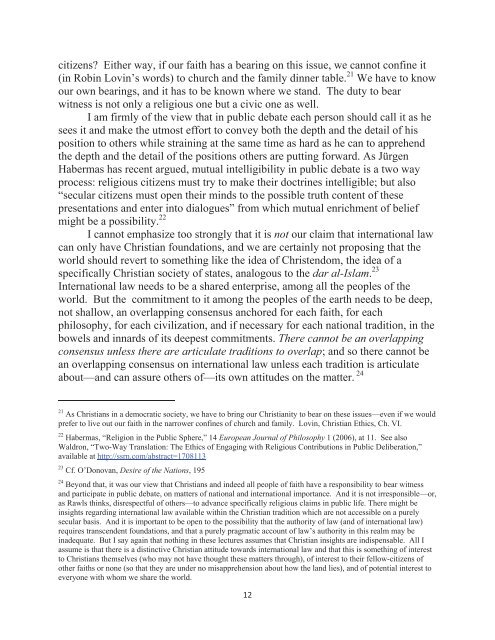International Legal Evangelism: Intelligence, Reconnaissance & Missions
International Legal Evangelism: Intelligence, Reconnaissance & Missions
International Legal Evangelism: Intelligence, Reconnaissance & Missions
You also want an ePaper? Increase the reach of your titles
YUMPU automatically turns print PDFs into web optimized ePapers that Google loves.
citizens? Either way, if our faith has a bearing on this issue, we cannot confine it<br />
(in Robin Lovin’s words) to church and the family dinner table. 21 We have to know<br />
our own bearings, and it has to be known where we stand. The duty to bear<br />
witness is not only a religious one but a civic one as well.<br />
I am firmly of the view that in public debate each person should call it as he<br />
sees it and make the utmost effort to convey both the depth and the detail of his<br />
position to others while straining at the same time as hard as he can to apprehend<br />
the depth and the detail of the positions others are putting forward. As Jürgen<br />
Habermas has recent argued, mutual intelligibility in public debate is a two way<br />
process: religious citizens must try to make their doctrines intelligible; but also<br />
“secular citizens must open their minds to the possible truth content of these<br />
presentations and enter into dialogues” from which mutual enrichment of belief<br />
might be a possibility. 22<br />
I cannot emphasize too strongly that it is not our claim that international law<br />
can only have Christian foundations, and we are certainly not proposing that the<br />
world should revert to something like the idea of Christendom, the idea of a<br />
specifically Christian society of states, analogous to the dar al-Islam. 23<br />
<strong>International</strong> law needs to be a shared enterprise, among all the peoples of the<br />
world. But the commitment to it among the peoples of the earth needs to be deep,<br />
not shallow, an overlapping consensus anchored for each faith, for each<br />
philosophy, for each civilization, and if necessary for each national tradition, in the<br />
bowels and innards of its deepest commitments. There cannot be an overlapping<br />
consensus unless there are articulate traditions to overlap; and so there cannot be<br />
an overlapping consensus on international law unless each tradition is articulate<br />
about—and can assure others of—its own attitudes on the matter. 24<br />
<br />
21 As Christians in a democratic society, we have to bring our Christianity to bear on these issues—even if we would<br />
prefer to live out our faith in the narrower confines of church and family. Lovin, Christian Ethics, Ch. VI.<br />
22 Habermas, “Religion in the Public Sphere,” 14 European Journal of Philosophy 1 (2006), at 11. See also<br />
Waldron, “Two-Way Translation: The Ethics of Engaging with Religious Contributions in Public Deliberation,”<br />
available at http://ssrn.com/abstract=1708113<br />
23 Cf. O’Donovan, Desire of the Nations, 195<br />
24 Beyond that, it was our view that Christians and indeed all people of faith have a responsibility to bear witness<br />
and participate in public debate, on matters of national and international importance. And it is not irresponsible—or,<br />
as Rawls thinks, disrespectful of others—to advance specifically religious claims in public life. There might be<br />
insights regarding international law available within the Christian tradition which are not accessible on a purely<br />
secular basis. And it is important to be open to the possibility that the authority of law (and of international law)<br />
requires transcendent foundations, and that a purely pragmatic account of law’s authority in this realm may be<br />
inadequate. But I say again that nothing in these lectures assumes that Christian insights are indispensable. All I<br />
assume is that there is a distinctive Christian attitude towards international law and that this is something of interest<br />
to Christians themselves (who may not have thought these matters through), of interest to their fellow-citizens of<br />
other faiths or none (so that they are under no misapprehension about how the land lies), and of potential interest to<br />
everyone with whom we share the world.<br />
<br />
12

















